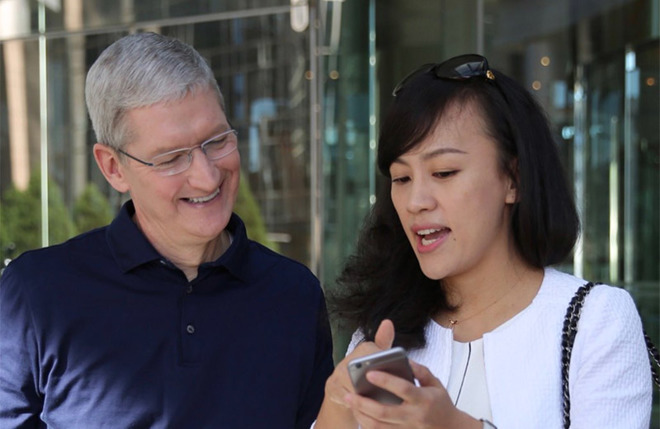Japanese tech giant SoftBank is reportedly in talks to back a $6 billion investment in Chinese ride-hailing firm Didi Chuxing, a move that could dilute stakes of existing backers like Apple.
Citing sources familiar with the matter, Bloomberg reports Didi is considering whether or not to accept the SoftBank-backed investment as the quickly growing company balances the interests of more than 100 backers. Agreeing to the massive infusion, some six times what Apple put in last year, would naturally dilute the stakes of prior investors.
Apple, Chinese social media firm Tencent and other Didi backers are themselves thinking about joining the SoftBank investment on a pro rata basis to retain their standing, the report said.
It is unclear if the Didi investment is being led by SoftBank or the SoftBank Vision Fund, the latter being a $100 billion tech fund dedicated to burgeoning industry startups. Though the fund has yet to close, probable initial investments include $45 billion from Saudi Arabia, $25 billion from SoftBank and a number of smaller sums from a variety of tech companies.
Apple earlier this year confirmed a $1 billion investment in the Vision Fund. That Apple is said to be considering a stake in the new Didi deal suggests the investment might be led by SoftBank itself.
After successfully navigating several investment rounds, Didi is currently valued at some $34 billion, the report said. The firm is using investor money to back ambitious projects around the world, including the purchase of Uber China's assets in last summer. That particular move secured the lucrative Asian market from a move-in by the world's ride-sharing market leader, which was operating at a loss in China to gain a foothold in the region.
More recently, Didi joined other ride-sharing services in furthering self-driving car technology, a trend for the industry. Going up against the likes of Uber and Google spinoff Waymo, the Chinese company earlier this month opened an artificial intelligence lab in Mountain View, Calif., near Apple's Cupertino headquarters. Staffed by robotics and AI experts like Charlie Miller, formerly Uber's self-driving team, the lab will focus on the development of intelligent driving systems and AI-based transportation security.
Apple is also widely rumored to be working on its own self-driving vehicle in Project Titan, but progress has been hampered by unforeseen roadblocks. While the iPhone maker's autonomous vehicle branch swelled to more than a thousand employees at its peak, a round of layoffs whittled down operations severely. The Project Titan team reportedly has until the end of 2017 to prove it can move forward on its own.
Recent reports suggest Apple is turning its focus toward self-driving car software and related platforms. In October, for example, it was reported that the company poached engineers from BlackBerry's QNX to develop augmented reality car navigation systems.
 Mikey Campbell
Mikey Campbell







-m.jpg)






 Christine McKee
Christine McKee
 Chip Loder
Chip Loder
 Malcolm Owen
Malcolm Owen
 Marko Zivkovic
Marko Zivkovic
 Wesley Hilliard
Wesley Hilliard







-m.jpg)




6 Comments
I still think Apple would be wise to focus on scheduling, dispatch, mapping/routing, and load balancing of fleets within each geographic area, leaving the liability risk of autonomous driving mode in the hands of the individual vehicle makers.
The actual ride hailing companies aren't really worth much, and the "self-driving" cars will only be as valuable as the software that runs them. It's also becoming more obvious that in order for the "self-driving" cars/trucks to really work, they'll have to get special treatment from the government in terms of infrastructure changes and legal changes....think priority lanes for self-driving vehicles and very limited accountability for accidents etc.
I just wonder how Apple would fare (ha, no pun intended) in getting auto companies to use their software if it encompassed more than it does now. I've been reading about this, and auto companies are concerned about third parties getting info about their customers that they won't be able to get. Since Apple is notably hard fisted about sharing data, anything they may do might not get off the ground.
and really, if they're not going to have their own car, just what is this software they're working on? Will it replace QNX, will it replace the automotive focused Linux that's gained momentum, and now controls the same percentage of cars that QNX does? If so, then Apple is developing a car OS. It has to be pointed out that neither macOS, nor iOS can work as a car OS. Car OSs are near realtime OSs, that are needed for machine control. Apple's OSs aren't designed for that purpose, so they either have to redesign iOS, most likely, for that purpose, or come up with something new.
as car manufacturers have already expressed disinterest in that concept, I don't see how Apple could sell it.
in addition, we don't know of any "unforeseen roadblocks" in Apple's Titan projects, except for a few highly placed engineers and project managers leaving. It's likely that Apple simply decided that they didn't want to bother with all the required regulations, and possible responsibility of manufacturing realities. But, it's also been pointed out that Magna, the custom auto manufacturer, who has designed, and even manufactured cars for companies such as BMW, would navigate that for Apple. Manga has been working directly with Apple in this project, and Apple employs a number of high level Magna employees, or did. So it's possible that Magna would have been highly involved in the design of Apple's car, and even building it.
but, it's all speculation, as nobody, no matter what they may claim, knows what's going on at Apple about this, or much anything else.